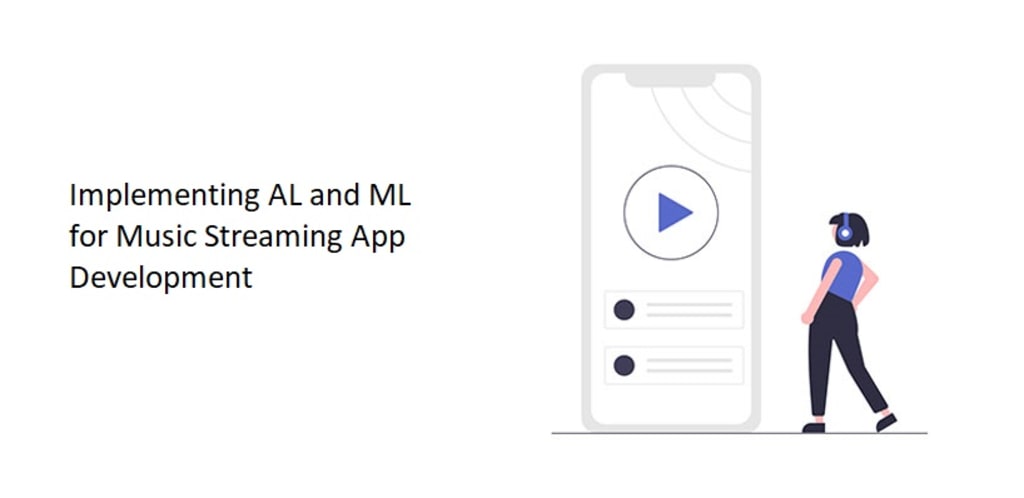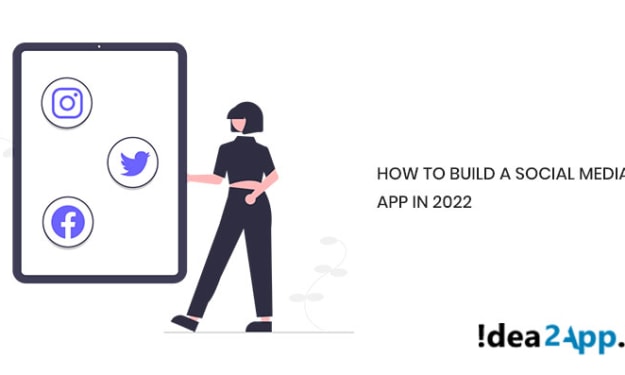Implementing AL and ML for Music Streaming App Development
Do you want to know how AI and ML can be implementing for the music streaming app development

Artificial intelligence is an enigma for most people. We hardly understand it, and we get even more confused when we try to imagine it in the space of music. Some people think that AI consists of a computer program that can create all types of music on its own, with no input from a human. In reality, however, Artificial Intelligence development helps music streaming services and video streaming services in many ways, from song recommendations to music discovery and even personalization. Let’s go through some of the best examples of how Artificial Intelligence development and machine learning development are becoming the top driving factors of music streaming services and video streaming services.
Predictive Analysis Predictive analysis is one of the most obvious applications of artificial intelligence in the streaming industry. By analyzing data points such as users’ preferences and listening habits, advanced algorithms can predict what this listener wants to hear next and serve it upright when they want it. This technology allows digital music services to deliver their users’ personalized playlists that they won’t get bored with or skip over.
Recommendations Sometimes, you feel like hearing some new music, but you don’t know what genre to choose from or where to start looking for songs. That’s where predictive analytics comes into play again: by studying your data points (previous plays, favorites, etc.)
Artificial Intelligence is Already Widely Employed in the Music Streaming Industry. Here are Some of its Main Applications:
1 Recommendation engine
AI is used as a tool for recommending tracks to users based on their preferences, location, and history of consumption. The algorithm analyzed the tracks that a user has listened to and offered similar songs based on their similarity, ratings, etc. So far, Spotify is using this technology more than any other streaming service. Music style recognition – by analyzing the audio waveforms, the AI identifies the style of music and serves tracks with similar styles. For example, if you are listening to EDM music and want to listen to something similar, then AI will offer you some EDM songs. Not only do they recommend matching songs but also matching artists. This technology is currently being tested by Beats Music and Apple Music services.
2 Music copyright detection
AI is used by all major music streaming services to identify copyrighted content and prevent it from being streamed (Spotify has removed 30 million tracks for this reason). By analyzing audio waveforms, the AI identifies copyrighted content.
Artificial intelligence is becoming one of the most important parts of the music streaming industry. It is already implemented in most popular services and will be used in even more projects in the near future.
3 Spotify: The Streaming Giant
Spotify is the main music streaming service, and it was launched in 2008. At present, it is the largest streaming service by the number of active paying subscribers. It also has one of the largest catalogs, which consists of over 30 million songs. The majority of users on this platform attribute their use of Spotify to its exceptionally unique AI tools for music recommendations.
The insurmountable level of personalization attracts many people to use Spotify, and it all started with clever acquisitions. In 2014, Spotify acquired The Echo Nest for $100 million, an online music intelligence company that was founded in 2009 by three MIT researchers: Brian Whitman, Tristan Jehan, and Jim Lucchese. The Echo Nest has developed a proprietary music intelligence platform with a huge database of metadata – information about data – including song lyrics, artist biographies, reviews, and other things that are related to the music industry.
The first thing that people are usually impressed with when they start using Spotify is the personalized playlists, which they generate on the go. The algorithm analyzes your listening history, and it creates a set of songs that you might like to listen to next. These playlists are based on the so-called "collaborative filtering" technique, which searches for similar users' profiles using big data analysis and machine learning algorithms. This helps Spotify understand each individual user's taste in music and then create playlists with only the best-suited songs for that particular person.
Another important feature that has attracted many users to use Spotify is its "Discover Weekly". Through this platform, users can find new songs from different artists by simply pressing play. Each week, Spotify tracks your listening history and it creates a playlist with songs that sound similar to what you've been listening to lately.
4 Collaborative Filtering
The key to this recommendation engine is the "collaborative filtering" method. Spotify's engineers use a sophisticated algorithm to take advantage of the wisdom of the crowd. The algorithm first groups the users based on their listening habits and then assigns each group a "trust factor." It then suggests new music to the listeners depending on what the members of their group listened to.
Taste in music is not a personal matter; it's a social one. This idea has been confirmed by Spotify's data, which shows that when people are listening to music in groups, they tend to choose similar songs. This is why collaborative filtering works so well: it relies on the wisdom of crowds and allows people to discover new artists and new tracks by following their friends' recommendations.
The collaborative filtering model clearly shows how social behavior can be used for making music recommendations. The basic idea is that if you know a lot about your friends' musical tastes, you can make good recommendations for them by comparing their tastes with those of other people like them.
5 Apple Music: Standing Strong at Number Two
Apple Music has to be the least surprising new product from Apple in years. The company didn't just launch a music streaming service; it created an entirely new category of products with the launch of Apple Music. It is not a streaming music service: it's a streaming music service that also has on-demand video, original content, and social networking features (and you don't even have to pay for any of them).
Apple has always been bold when it comes to launching services. But its approach was always more about getting services out there and seeing what sticks, rather than doing extensive market research. With Apple Music, the company is once again going where it hasn't gone before – this time with an online music streaming service that aims to reinvent the way we listen to music.
The key difference between Apple Music and other online music services is the focus on human curation. We've seen many attempts at automating playlists in the past, but they all fell short of matching a human curator's ability to pick songs based on a user's preferences. And while many people like listening to playlists created by their favorite artists, most people feel that these playlists miss something – they don't accurately reflect either the artist or their own tastes.
6 Amazon Music: How Artificial Intelligence Sounds
Today, music streaming app services are popular for the same reason that radio was popular at the beginning of the 20th century: people love having access to unlimited amounts of music. People who prefer listening to their own music in a variety of ways have a number of different options to choose from in terms of streaming services. However, few streaming services are able to provide as many features and tools as Amazon Music.
Tidal may still be the most luxurious option, but it is also more expensive than Amazon Music, and Apple Music combined. Apple’s music service can match Tidal’s unique features, such as Beats 1 Radio and Connect, although it lacks some tools available on both other platforms. Spotify, on the other hand, remains the market leader when it comes to free accounts and has improved its premium service by recently introducing a “family plan” that allows up to six people to share a single account.
However, none of these services offer an intelligent personal assistant that can play music upon request or recognize what you are playing. That’s where Amazon Music comes into play with Alexa integration. The fact that Alexa is integrated with Amazon Music makes it one of the top three music streaming services today.
Conclusion
Artificial intelligence (AI) has been around for a while now, however, it is only recently that we are experiencing its impact. The speed at which AI solutions have been adopted and their influence in our daily lives are astonishing. Companies of all sizes have incorporated AI in their business operations, and some of the biggest companies in the world are driving the adoption of AI.
We've seen how Artificial Intelligence solutions have revolutionized the consumer experience by making everything from music streaming to customer service more accessible and reliable. But what about the enterprise world? Is AI relevant for the enterprise as well? The answer absolutely is yes!
The adoption of Artificial Intelligence solutions can seem slow at first. It takes time for organizations to become aware of this disruptive technology and to start building products and services based on it. But once people grasp the potential that artificial intelligence holds, there is no stopping them from taking advantage of it.
As you can see, you cannot escape Artificial Intelligence if you stream your music with any of the major providers out there. These companies have engraved Artificial Intelligence solutions in their day-to-day operations and continue to add value to their products. So, where do you start?
About the Creator
Tracy Shelton
With more than 10 years of experience in Online Marketing and as a Digital Marketing Consultant at Idea2App,






Comments
There are no comments for this story
Be the first to respond and start the conversation.